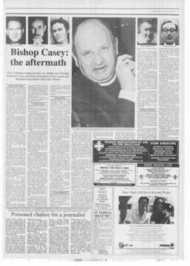Page 6, 22nd May 1992
Page 6

Report an error
Noticed an error on this page?If you've noticed an error in this article please click here to report it.
Tags
Share
Related articles
Sparked Into Life By A World Of Letters
The Assumption A Feast Unveiled By Ruth Rees, Page 5
Unobtrusive Catholicism
Intentionally Sparkling Diversion
Alcitin On The Latest Books
Not a spark of vigour in those males
The Women of Muriel Spark by Judy Sproxton (Constable, £9.95) Candida Brazil THE title of Judy Sproxton's slim critical study, The Women of Muriel Spark, is. in these feminist times, misleading.
Why women? Women as opposed to men? Does Spark really write about women's inner lives? Are the women in charge'? Are Spark's men ridiculous? Does she portray women because that is what she knows about?
Perhaps in anticipation of some of these questions, Sproxton warns in her introduction that Spark is not a feminist in the usual sense. She claims, however, that Spark's achievement in constructing female character is unrivalled in the 20th century Catholic novel.
Sproxton explains by putting Spark's women into three types: the mature, the powerful and the victim. Spark's "mature" woman, Sproxton claims, has vision. Women of "power" are consumed with self-love, unable to see a perspective beyond themselves.
Sproxton's third type women as "victim" is often necessary in Spark's plots. These women invite their own victimisation either deliberately or unknowingly.
Sproxton argues obliquely that the link between these types is "faith" and that Spark's work is about the building of a "true human", an area relating to faith. In the case of the "mature" woman, it is faith that allows her to accept her limitation, and in that of the woman of "power", the character will fail as she has not faith in a law beyond her own.
Despite Sproxton's refreshing and jargon-free style, her argument lacks rigour. Spark's characters do not invite such categorisation, and what reads suspiciously like an undigested PhD thesis is largely taken up with plot synopses.
Miss Spark's fans will feel that the essence of her heroines has eluded Sproxton her witty and curious preoccupation with women's institutions girl's schools, boarding-houses, or convents -goes unmentioned. Selina Redfern's seductive image "furled like a long sash, in her hair, however soulless, seems as far from failing as does the "soaring and diving spirit" of Miss Brodie .
And those outrageous girls with their slim naked bodies, slippery with margarine, wriggling out of the lavatory window in the May of Teck will long outlive the unfortunate Nicholas Farringdon, for all his insight into the human condition.
blog comments powered by Disqus











